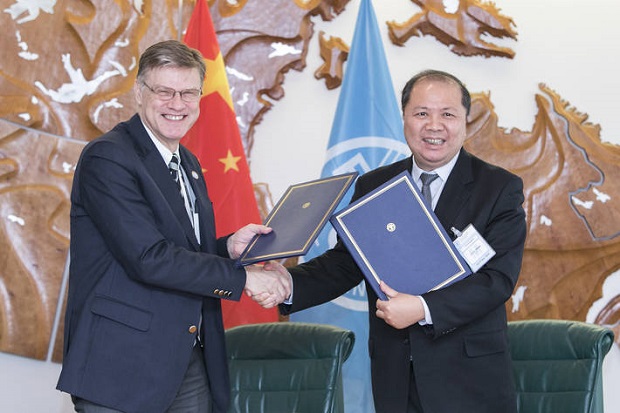
News
Industry update
Sustainability
UN, Chinese fisheries academy to boost aquaculture sustainability
January 2, 2020 By Nestor Arellano
 Arni Mathiesen, FAO Assistant Director-General for Fisheries and Aquaculture, and Wang Xiaohu, President of Chinese Academy of Fishery Sciences. (Image: FAO.Org)
Arni Mathiesen, FAO Assistant Director-General for Fisheries and Aquaculture, and Wang Xiaohu, President of Chinese Academy of Fishery Sciences. (Image: FAO.Org) The United Nation’s Food and Agriculture Organization (FAO) and the Chinese Academy of Fisheries Science (CAFS) will further its efforts to support the aquaculture industry in developing countries.
Through the South-South Cooperation (SSC) and the Triangular Cooperation (TrC), the two organizations plan to develop more seminars and workshops as well as technology and information exchanges in the industry.
The FAO and the CAFS established the South-South Cooperation (SSC) 2009. Since then, China has shared its knowledge and technologies with farmers in Africa and Asia to raise agricultural productivity and sustainability in areas such as fisheries and aquaculture, cereal production, and animal husbandry.
In celebrating the 10th anniversary of the FAO-CAFS South-South Cooperation, the two organizations recently announced a new agreement to strengthen their cooperation in building capacity and sustainability of the aquaculture industry, particularly in the Asia-Pacific region.
The CAFS plays an influential role in the national fisheries science and management policy in China. The academy supports developments in fisheries engineering and technology in a wide range of ways.
The FAO is a specialized agency of the UN that leads international efforts to defeat hunger and improve nutrition and food security.
Under the accord, the partners will support initiatives that help build the resilience of fish farmers and other organizations working in the sector.
The partnership also aims to boost efforts towards better regulations and the safety of fish products.
The SSC and TrC focus on fostering collaboration among developing countries and offer a complementary model to the traditional relationship between donors and recipients. The SSC and TrC have been effective in creating jobs, building infrastructure and promoting trade in countries across the global South.
To date, the SSC has benefited more than 70, 000 people directly in 12 developing countries in sub-Saharan Africa and Asia.
Print this page